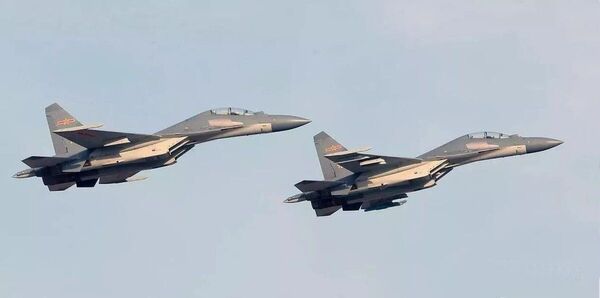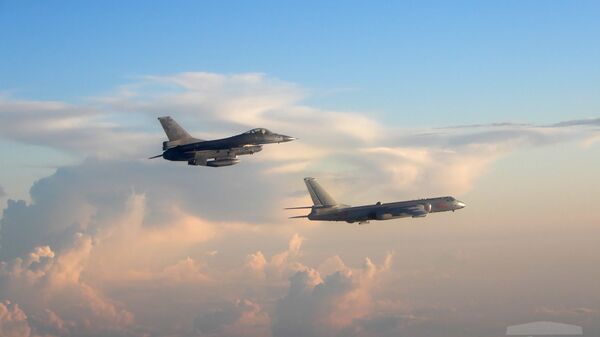On Friday and Saturday, a total of 37 Chinese aircraft crossed the median line in the Taiwan Strait, the narrow body of water that separates the island from the mainland. Taipei scrambled fighters to intercept the group, which contained a mix of H-6 bombers, J-10, J-11 and J-16 fighters and a Y-8 maritime patrol aircraft, according to Taiwan’s Ministry of Defense.
US Statesman Visits Island
The incidents came amid an unprecedented event: US Undersecretary of State Keith Krach’s visit to the island, which made him the highest-level US government official to set foot on Taiwan since the US ceased recognizing the Taiwanese government as the legitimate rulers of all of China in 1979.
The Taiwanese Ministry of Foreign Affairs tweeted upon Krach’s departure on Sunday that his visit reflected “the value of late President Lee’s contributions to Taiwan democracy, let both sides discuss key issues while strengthening the global partnership.” Lee Teng Hui was president of the Republic of China from 1988 until 2000, its first to be directly elected by the voting population. He died on July 30.

However, Beijing took special umbrage at this event. On Monday, Chinese Foreign Ministry spokesperson Wang Wenbin blasted Krach’s visit as a political provocation against China and an encouragement of its separatist movement, toward which President Tsai Ing Wen is seen as sympathetic.
"We urge the US to correct its mistakes, stop all official and military contacts with Taiwan, and stop interfering in China's internal affairs and stop words and deeds that undermine China-US relations and peace and stability across the Taiwan Straits," Wang said, according to the Global Times.
Taiwan and the One China Policy
In a separate Global Times op-ed on Monday, the Communist Party of China-connected paper wrote, “Since Tsai took office, she betrayed the 1992 Consensus and created a confrontation between the two sides of the Taiwan Straits. Moreover, amid the US' escalating anti-China campaign, Washington and the DPP [Democratic Progressive Party] have further deepened their collusion.”
It is worth noting that the 1992 “One China” Consensus, the informal outcome of several meetings that saw the two sides agree on the principle of Taiwan and China being one country, has been denied to exist by Lee, who was Taiwan’s president at the time.
“Taiwan is an inalienable part of China. The PLA's [People’s Liberation Army’s] relevant exercises are necessary to maintain China's sovereignty and cross-Straits security. We love peace, but we are increasingly aware that peace is dependent on military strength, and the firm will to use them when necessary,” the Times continued.
“The collusion between the US and the DPP authority is threatening the safety and welfare of all Taiwan people, as well as regional security,” the editors wrote. “It has pushed the island to an impasse. The Tsai authority should either stop playing with fire before it is too late, or prepare for dire consequences.”
Between 1912 and 1949, the Republic of China governed all of China, but after losing the civil war to the communist Red Army, its authority remained solely on the island of Taiwan, which the Red Army was unable to invade. When the People’s Republic of China (PRC) was founded in Beijing that same year, both governments claimed to be the sole legitimate ruler of all of China and required countries engaging in diplomatic relations with them to do the same.
What’s more, all but 14 of the world’s nations have agreed with Beijing’s position by establishing diplomatic relations. The United States maintains a precarious situation, having switched recognition to Beijing in 1979 but maintaining a backdoor relationship with Taipei, funneling it weapons - typically older models, but sometimes newer tech - sufficient to deter any annexation attempt by the PRC.
Taiwan Strait Mid-Line ‘Does Not Exist’
Taiwan’s Ministry of Defense commonly claims that Chinese aircraft have violated Taiwanese airspace once they cross the median line of the Strait, but Wang rejected this notion during his Monday comments.
“Taiwan is an inseparable part of Chinese territory,” he told reporters in Beijing, according to Reuters. “The so-called mid-line of the Strait does not exist.”

However, even if the line did exist, it would not give Taiwanese jets the legal authority to engage Chinese aircraft that cross it. According to the UN Convention on Laws of the Sea, nations only have jurisdiction over airspace and sea within 12 miles of their coastlines - at the waterway’s narrowest point, the median line is 40.5 miles from Taiwan’s coast.
Further, the Taiwan Sentinel noted in April 2019 that the line has no bearing in international law, so “neither side is technically violating the other’s airspace by crossing it.”
“The convention that neither side’s warplanes shall cross the line is nothing more than an informal agreement,” the Sentinel noted. “In other words, if Taiwan were to shoot down a Chinese warplane that crossed the median line, international law would hold China to be in the right and Taiwan to be in the wrong … Taiwan technically has no legal right to shoot down such aircraft before or unless they have actually entered within 12 miles of the Taiwanese coast itself.”
Best Defense is a Good Offense
Sputnik reported last week that Washington was preparing to approve its second-largest weapons sale to Taiwan, a $7 billion deal that includes a slew of weapons systems.
Among them are AGM-84H/K SLAM-ER missiles, a long-range ground strike version of the Harpoon anti-ship missile with a range that can reach across the Strait and inside the Chinese mainland. The New York Times noted the weapon can be fired from beyond the range of Chinese radar. The deal also reportedly includes MQ-8B Reaper unmanned aerial vehicles, combat drones used by the US to wage its undeclared wars across several countries in Africa and Asia and which until very recently were considered too dangerous to be allowed to be sold anywhere else.
These weapons are likely what Taiwan’s military leaders had in mind when promising to “counterattack” any Chinese move.


